Beth Tabler's Blog, page 197
March 26, 2022
Review – Gloomhaven the Board and Video Game
Before we talk about Gloomhaven the video game, we need to talk about Gloomhaven the board game. The board game is, frankly, not designed for casual play. This is good news to the hardcore game fanatic, who will delight in the complicated map pieces, the rule-laden cards, and a seemingly endless sea of little cardboard tokens. The game has an unapologetically harsh difficulty curve, and if you want to see everything the game has to offer you’re going to need to get pretty good at the tactics of the game.
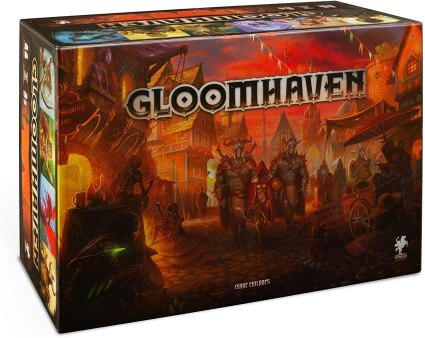 The good news about the video game is that the computer handles all of the fiddly bits for you. The game plays more smoothly (and much more quickly) when the computer is keeping track of everything for you. There are, however, a few flies in this ointment. My main complaint is that in its effort to streamline the gameplay, it actually obscures some important game mechanics. For example, there is are two decks of cards for Events, and once each Event is resolved, the card is either placed at the bottom of the deck (to be played again later) or is removed from the game entirely. In the board game version, this provides important context as to the nature of the Event; in the video game, players are simply not informed what happens to the Event card. There are many similar experiences that are by their nature obvious while playing the board game, and completely opaque in the digital game.The story told by the game is fairly solid. I don’t know that I’d sit down and read the novelization if one is ever written, but there’s certainly enough going on to keep players interested and motivated to continue. There are light-hearted moments and plenty of comedy beats, but the overall feeling of the story is… well, gloomy. A good rule of thumb is that a happy character in Gloomhaven is very likely either getting ready to incite some violence, or is unwittingly on the precipice of disaster. Not always, of course, but very, very frequently.
The good news about the video game is that the computer handles all of the fiddly bits for you. The game plays more smoothly (and much more quickly) when the computer is keeping track of everything for you. There are, however, a few flies in this ointment. My main complaint is that in its effort to streamline the gameplay, it actually obscures some important game mechanics. For example, there is are two decks of cards for Events, and once each Event is resolved, the card is either placed at the bottom of the deck (to be played again later) or is removed from the game entirely. In the board game version, this provides important context as to the nature of the Event; in the video game, players are simply not informed what happens to the Event card. There are many similar experiences that are by their nature obvious while playing the board game, and completely opaque in the digital game.The story told by the game is fairly solid. I don’t know that I’d sit down and read the novelization if one is ever written, but there’s certainly enough going on to keep players interested and motivated to continue. There are light-hearted moments and plenty of comedy beats, but the overall feeling of the story is… well, gloomy. A good rule of thumb is that a happy character in Gloomhaven is very likely either getting ready to incite some violence, or is unwittingly on the precipice of disaster. Not always, of course, but very, very frequently.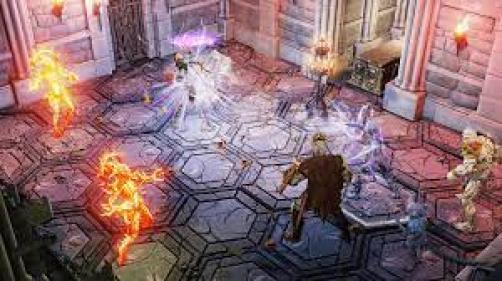 Overall, I feel like Gloomhaven the video game is a sort of ersatz version of the board game. It’s entertaining, and also quick and convenient – but perhaps Gloomhaven was never meant to be quick or convenient. It certainly loses something in the translation. If you’re looking for the full Gloomhaven experience, I’d recommend the board game. If you enjoy the board game but want to skip the token-fiddling, or want to play with a friend online, then the digital edition of the game might be just what you need. Otherwise, I have to say that you can find games with equally good tactical elements, better story, better presentation, and better performance for half the price.Value: 3 / 15Story: 12 / 15Gameplay / Mechanics: 10 / 15Presentation: 4./ 15Fun: 32 / 40Add 15 points if you’re a fan of the board gameAdd 10 points if you’ve got a deep tactical itch that needs scratchingOverall score out of 100:: 61 – 86For reference:Value: how well does the game reward your investment of both dollars and time?Story: Would you watch a video of someone else playing this game just for the sake of the story?Gameplay / Mechanics: If this game were only abstract tokens and numbers, how much fun would it be?Presentation: How pleasant is this game to interact with?Fun: Sometimes, a game is more (or less) than the sum of its parts; the most important thing is whether it was an enjoyable experience.Check Out Gloomhaven
Overall, I feel like Gloomhaven the video game is a sort of ersatz version of the board game. It’s entertaining, and also quick and convenient – but perhaps Gloomhaven was never meant to be quick or convenient. It certainly loses something in the translation. If you’re looking for the full Gloomhaven experience, I’d recommend the board game. If you enjoy the board game but want to skip the token-fiddling, or want to play with a friend online, then the digital edition of the game might be just what you need. Otherwise, I have to say that you can find games with equally good tactical elements, better story, better presentation, and better performance for half the price.Value: 3 / 15Story: 12 / 15Gameplay / Mechanics: 10 / 15Presentation: 4./ 15Fun: 32 / 40Add 15 points if you’re a fan of the board gameAdd 10 points if you’ve got a deep tactical itch that needs scratchingOverall score out of 100:: 61 – 86For reference:Value: how well does the game reward your investment of both dollars and time?Story: Would you watch a video of someone else playing this game just for the sake of the story?Gameplay / Mechanics: If this game were only abstract tokens and numbers, how much fun would it be?Presentation: How pleasant is this game to interact with?Fun: Sometimes, a game is more (or less) than the sum of its parts; the most important thing is whether it was an enjoyable experience.Check Out GloomhavenThe post Review – Gloomhaven the Board and Video Game appeared first on BEFOREWEGOBLOG.
March 25, 2022
SIX ELEMENTALS AUTHOR INTERVIEW – MICHELE QUIRKE
 Six Elementals Author Interviews will introduce prospective readers to some of the best writers in their genre you may, or may not, have heard of, via a series of six questions. I encourage you to check out the work of these phenomenal creatives! Links to their websites and purchase links will always appear, accompanying the interview. Check them out!
Six Elementals Author Interviews will introduce prospective readers to some of the best writers in their genre you may, or may not, have heard of, via a series of six questions. I encourage you to check out the work of these phenomenal creatives! Links to their websites and purchase links will always appear, accompanying the interview. Check them out!
I am very humbled to be joined by the fantastic Michele Quirke, author of historical fantasy. Michele’s current published work is: The Fires of Treason.
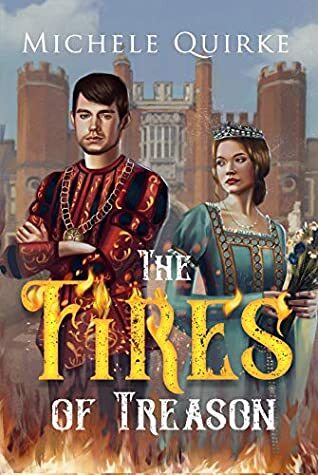 P.L.: Thank you so much Michele for joining Six Elemental Interviews! I loved The Fires of Treason! Can you please tell readers of this interview what your awesome book is about?
P.L.: Thank you so much Michele for joining Six Elemental Interviews! I loved The Fires of Treason! Can you please tell readers of this interview what your awesome book is about?
Michele: Princess Elizabeth has always idolized and supported her older brother, but when Greg is accused of treason and banished, her loyalty to him is tested in ways she never could’ve imagined. As she leaves her luxurious lifestyle behind to join him in exile, she must learn to cope with the everyday struggles of the working class, all while keeping her true identity a secret. Facing new hardships and the looming threat of execution, Elizabeth will need to toughen up if she has any chance of surviving outside the palace walls.
Prince Gregory spent his entire life trying to prove himself worthy of the crown until his banishment releases him of all the pressures and obligations that have chained him down. Although he has no intention of raising an army to defend his birthright, he soon learns that not everyone is content to let him walk away from the throne. With his sister’s safety and well-being to consider, Gregory must make a decision that will change both their lives forever.
P.L.: Oh, that synopsis would definitely make me want to buy the book, which of course, I did! Who are some authors that have influenced your writing style?
Michele: In all honesty, I’m not quite sure if any authors have influenced my actual writing style. I sort of just write what I feel and haven’t given much thought to where the influence come from. That said, there is one author who has always inspired me. Jodi Jensen is my critique partner and basically the person who encouraged me to believe in myself and my work. I never would’ve published if not for her. She taught me so much and I am forever grateful that she was in my corner when I needed that push to pursue my dream of being a writer.
P.L.: Jodi sounds fantastic! It’s obvious she has a positive impact on you and your writing. You are a popular and well-respected self-published author. Your book is of exceptionally high quality in all facets: writing, editing, cover design. There still remains a perception in some circles that self-published books are of a lesser quality than traditionally published. Do you have any comments about that?
Michele: Truth be told, I was of that mindset a few years ago. However, once I joined Twitter and actually started reading more indie and self-published books, I learned just how wrong I was. There are so many incredible indie books out there. I suppose I feel pity for people who think this way because they are going to miss out on some truly amazing stories if they only read books that have been traditionally published.
P.L.: You are so right! The bulk of my own TBR is self-published work now, because I completely agree with you, so many amazing self-published books out there! Your novel, The Fires of Treason, is impeccably researched, and the setting feels like a real European kingdom. How much research was involved in writing your book?
Michele: I probably spent more time researching than writing. Although The Fires of Treason takes place in a fictional kingdom, it’s based on Elizabethan England. Therefore, I tried to keep everything as accurate for that time period as possible. One of my favorite resources was A Compendium of Common Knowledge 1558-1603 by Maggie Secara. It was super helpful!
P.L.: That sounds like an excellent resource! What inspired you to write The Fires of Treason?
Michele: This might be a little strange, but it was heavily inspired by Avatar: The Last Airbender . Prince Zuko and Prince Gregory (one of my protagonists) have a lot in common. Both have power-hungry older sisters, both have callous fathers, and both were banished. At the time, I was also watching The Tudors . So The Fires of Treason started off as a little nod to both shows, then quickly evolved into its own thing.
P.L.: Wow, I must admit I did not see Avatar: The Last Airbender coming, but in reflection I can see the similarities between Zuko and Gregory! And I loved The Tudors! That I can totally see in terms of comparisons to your book! Great stuff! Do you have any advice for aspiring writers?
Michele: Honestly? Just write. Enjoy yourself. The rest will come with time.
P.L.: Wise counsel! It’s been fantastic to speak to you, Michele! Thanks for being interviewed!
Check out the original interview here
Buy The Fires of Treason on Amazon here
Follow Michele Quirke on Twitter @MicheleQuirke

The post SIX ELEMENTALS AUTHOR INTERVIEW – MICHELE QUIRKE appeared first on BEFOREWEGOBLOG.
March 24, 2022
SIX ELEMENTALS AUTHOR INTERVIEW WITH T.L. COUGHLIN
 Six Elementals Author Interviews will introduce prospective readers to some of the best writers in their genre you may, or may not, have heard of, via a series of six questions. I encourage you to check out the work of these phenomenal creatives! Links to their websites and purchase links will always appear, accompanying the interview. Check them out!
Six Elementals Author Interviews will introduce prospective readers to some of the best writers in their genre you may, or may not, have heard of, via a series of six questions. I encourage you to check out the work of these phenomenal creatives! Links to their websites and purchase links will always appear, accompanying the interview. Check them out!
 I am very honoured to be joined by the best-selling YA fantasy author, T.L. Coughlin! T.L’s current published work is: Of Us and Them.
I am very honoured to be joined by the best-selling YA fantasy author, T.L. Coughlin! T.L’s current published work is: Of Us and Them.
P.L.: This is an incredible treat for me T.L. to be able to interview you! Thank you so much for joining Six Elementals Interviews! Congratulations on your recent debut novel, Of Us and Them! And kudos at having signed a publishing deal with Darkstroke Books! It has been quite the successful past few months for you! Can you tell us about how you became a published author, and what the process of publication was like with Darkstroke?
T.L.: I started my querying journey less than a year ago. I’ve been writing ever since I was young, but never thought much of it, creating stories for my little sister for bedtime and submitting creative writing for school. Finally, when you-know-what happened, I finally had time to find my passion. From there, and after speaking with you, I was fully invigorated with inspiration! I wrote my novel in a few months, edited it countless times, had my beta readers look it over and then I was off to the querying trenches!
It was a tumultuous journey, filled with lots of self-discovery and of course, imposter’s syndrome. I received many agent rejections saying they loved my writing and that it was a great premise, but that they couldn’t quite figure out where to put it in the market. I was honestly so close to shelving the project to wait until it would be “less niche”, but then I came across a small publisher who focuses on literature of the darker nature.
Within a few months of submitting to them, I received a full request and shortly after an offer of publication! OF US AND THEM had finally found its perfect home! From there, it’s been a whirlwind of edits, cover design preparation (they are wonderful when it comes to a truly collaborative process) and now my book is set for publication in November!
P.L.: I am so glad you persevered and published your book!! Kudos to your determination and hard work! We readers are all happier for it! I absolutely loved reading Of Us and Them! It was such a great book! For those readers who have not yet read your exciting novel, can you please tell us what it’s about?
T.L.: Thank you so much! I am thrilled you enjoyed it. OF US AND THEM is a Young Adult science fiction novel with historical fantasy and a murder mystery. You follow seventeen-year-old Evren who was born for a sole purpose: to serve as a vessel for the Leviathans, a saviour alien species hidden in global dragon lore. She longs to join the secret society who concealed them in history and as the last of the twelve prophesied Paladins, she needs to. With the world in ruin, their unification will signal the Leviathans’ return to Earth to protect humans from their worst enemy: themselves.
But Evren’s ambitions are dashed when a Paladin is found dead. The murder sets her world ablaze and now she must stop the saboteur or risk destroying a celestial plan millennia in the making. However, finding the truth—and the killer—in a society built on deceit won’t be easy, especially with Evren’s fierce and guarded mother as its leader.
OF US AND THEM features reinterpretations of global dragon mythology, a formidable multiracial cast of teenagers, saviour aliens, and a high-stakes whodunit all set in the Canadian Rocky Mountains.
P.L.: It was a special significance for me, as another Canadian author, to see one of the settings for your book in such a beautiful part of our country! I truly believe all writers are motivated by reading some of their favourite authors. Who are your greatest writing influences? Which authors inspired you to write?
T.L.: My greatest writing influences are Anne McCaffrey and Marissa Meyer. They seem a bit on opposite ends, but this is where I draw most of my inspiration from. Anne McCaffrey is an epic world-builder that sets her characters off on adventures of self-discovery and high-stakes, not to mention she first had dragons as an alien species!
With Marissa Meyer, the way she writes young adult fiction is perfection and makes it incredibly relatable to the younger audience. The freshness and joviality, while also touching on more serious coming-of-age elements makes for a wonderful reading experience.
My favourite author, by far, though is Piers Anthony, an incredibly prolific writer who brings humour (and puns!) into everything he writes. I have been reading his Xanth Series since I was in my young teens and am entirely obsessed! I wish I could say I have his quick wit in my writing, but truly…it’s incomparable!
P.L.: Those are some fantastic authors you mention! I must say, I did find some wonderful little nuggets of humour too, in Of Us and Them, that made me chuckle. Moreover, your novel has some fantastic historical elements woven into its tapestry! Can you tell us about some of the research that you needed to complete to bring these elements to your work?
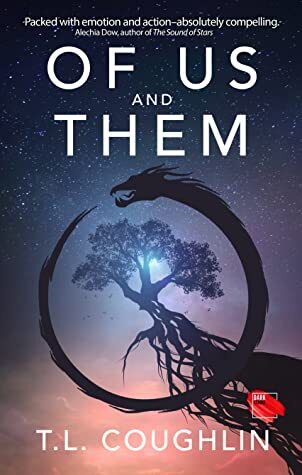 T.L.: Oh wow, I can’t even begin to describe how much research I did. The majority of my research was on dragon mythology that’s found throughout many cultures across the globe. I went into the common tales, but also ventured into the different interpretations and minor stories to ensure I was gaining the full view. It was an incredible experience because there were so many elements, as I was researching, that connected themselves!
T.L.: Oh wow, I can’t even begin to describe how much research I did. The majority of my research was on dragon mythology that’s found throughout many cultures across the globe. I went into the common tales, but also ventured into the different interpretations and minor stories to ensure I was gaining the full view. It was an incredible experience because there were so many elements, as I was researching, that connected themselves!
History truly wrote it for me, I just simply found the gold nuggets throughout and brought them into one book. I also researched heavily into the names of my characters. Each Paladin is a multiracial young adult who is from a mix of cultural background; however, there is one that they most identify with. From there, their weapons and their names were written to reflect that!
P.L.: I can attest having read your novel that all diligence in your research paid off! You have also been very successful at some of the marketing aspects of independent authorship including having your own merchandise! And boy does that swag look fantastic! Do you have any tips for your fellow authors about how to thrive in self-promotion?
T.L.: Thank you! I am a bit of a fan myself. The big tips would be, do your research, talk to other authors, and don’t be afraid to ask for guidance! (There’s no sense reinventing the wheel twice!) I searched through social media and various merchandise creators to see what type of promotions and marketing options were out there and then chose which suited my “brand” the best!
Also, don’t forget about buying the rights to images if you use them! I ended up doing a combination between purchasing an Adobe Stock extended licence that allows merchandising, and also created my own art! A huge element for me as well was having great friends like you, P. L., and the Darkstroke Author community. A lot of my resources were from these incredible networks!
P.L.: You have also been a huge inspiration for me and such a valuable resource and source of information and advice! Thank you so much! Co-incidentally, you are also now one of my favourite YA fantasy authors! Who are some of your favorite YA authors today?
T.L.: Goodness, always a hard question to narrow to a few. Currently, it would be Alechia Dow, author of The Sound of Stars (who I was lucky enough to get a cover endorsement from), Marissa Meyer, Neal Shusterman, Holly Black and Tracy Deonn!
P.L.: Again, some amazing choices! Holly Black in particular is an author whose books are on my TBR and I am really looking forward to reading them. Thank you so much. T.L., for joining me on Six Elementals Interviews! It was wonderful chatting with you!
The original interview is here
Buy Of Us and Them here Connect With The Author

E-mail: t.l.coughlin@outlook.com
Website: www.tlcoughlin.com
Twitter: @TL_Coughlin
Instagram: @TL_Coughlin
Facebook: TL Coughlin and T. L. Coughlin- Author Page
E-Book Preorder: http://mybook.to/ofusandthem
The post SIX ELEMENTALS AUTHOR INTERVIEW WITH T.L. COUGHLIN appeared first on BEFOREWEGOBLOG.
#SPFBO7 Review – The Mortal Blade by Christopher Mitchell
The Mortal Blade is a solid fantasy story; one that readers who love military and political fantasy, as well as stories with huge winged lizards will enjoy. And if you like books where the gods walk among us then this should be right up your alley too. The Mortal Blade won’t hit you in the feels, it won’t rock your foundations, but it will give you hours of enjoyment when you need a good read to settle into.
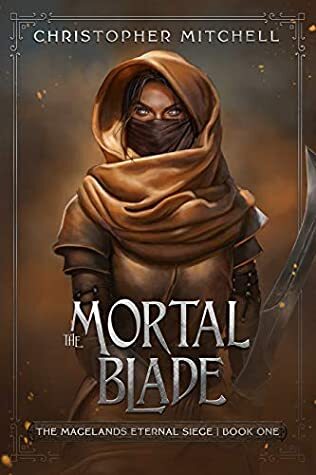 The narrative starts off strong with an opening scene filled with deception and close-cut action. It was a great way to begin the book and felt like the opening to a movie. I thought it was really well done and was a great intro to one of the main characters and some of her special abilities. That first chapter hooked me and did it’s job of establishing my expectations for what would follow.
The narrative starts off strong with an opening scene filled with deception and close-cut action. It was a great way to begin the book and felt like the opening to a movie. I thought it was really well done and was a great intro to one of the main characters and some of her special abilities. That first chapter hooked me and did it’s job of establishing my expectations for what would follow.
Christopher Mitchell’s writing, from beginning to end was solid and the pacing was very even. I never felt like there was a long slog in the middle, or that it dropped off at the end. Quite the opposite really. Each chapter was paced well with narrative tension and action building toward a climax and then settling in for the start of the next. I never felt bored and my mind never wandered with this read. Mitchell’s writing was as good as his pacing. I can’t remember a single instance of stumbling over a weird turn of phrase or word choice; the dialogue was on point; and while the prose wasn’t purple or flowery, for this kind of book it isn’t meant to be. I don’t want to call it journeyman because that implies a slight insult, but it just worked as needed. Like I said, it was just solid from start to finish.
I also thoroughly enjoyed the characters. The blurb for the book only mentions two which is a little disappointing because there are two more primary POV characters (Aila and Daniel) who add significantly to the story, one of whom was a favorite. And there’s one non-pov “character” who adds some very important flavor and drama to the story who I found myself looking forward to reading about more and more as the chapters flew by. Each character is varied in skills, abilities, and background and pushes the plot along in their own unique ways. I can see where some readers may be annoyed by Daniel, the young lieutenant in the city guard (for reasons I won’t get into here), but I liked his character development. I don’t necessarily like him but I did like what he brings to the book in terms of conflict and drama within the larger story. I also think he’ll be more important in future books. At first I thought Corthie was way overpowered, but as time went on those feelings were assuaged as more of the history and worldbuilding was brought to the fore. Aila was something of a badass (like Corthie) and has some awesome abilities, and she brings a good bit of conflict and drama to the plot as well. Maddie was fun and had that rebellious snarky quality I enjoy in characters. But the characters are where my first quibble’s with the book are found. What I said about Corthie being a little OP still has a negative side. He’s waiting for his sister to arrive to rescue him, but in reality he doesn’t need her. It seemed he could rescue himself without any help from anyone else if he wanted to, and that makes me wonder if the plot could have or should have gone in a slightly different direction earlier than it did. Then there’s the love story that develops between a couple of the characters. I’m not opposed to love stories at all, but this one was just a bit far-fetched in terms of how quickly it happened, and the dynamics between the characters. I won’t give it away here, but when you read it I’m sure you’ll understand what I’m talking about. The love story just didn’t work for me and unfortunately, it does help to drive part of the plot later in the book. It wasn’t enough of an issue for me to become frustrated with the story, but I did shake my head at it.
The worldbuilding in The Mortal Blade was something I enjoyed but at the same time it also warred with my suspension of disbelief. The entire story happens within the confines of a single large city. And it seems that the entirety of humanity exists within this one city. Every year on a seasonal cycle the greenskins (seems like orcs…maybe not) appear outside the walls and lay siege to the city, and every year the soldiers on the walls fight them off. It’s a pretty cool concept and leaves a lot of mystery about what else is in the world and how big it is. But that’s also where things began to give me pause. There’s a LOT of people in this city. It’s pretty huge. How do they sustain themselves? How do they grow enough food within the walls; how do they have enough wood for fires to heat and cook; how do they get enough water; how do they get enough materials to make things if there’s no one else to trade with? Now, there does seem to be some connection to perhaps another world outside of this one but it isn’t really explored much. I kept getting hung up on this point and eventually I just told myself to ignore it and enjoy the book, which I did, but these questions always lurked in the background.
What I enjoyed most however is what you’d hope to enjoy most with a book. The story. I dug it. A family of gods and demi-gods who rule a city in person. A city made up of have’s and have nots, the nobility, the poor, the soldiers, and the criminals. Only this family of gods is VERY dysfunctional. They’ve already undergone one civil war centuries ago and now a new one threatens. The city is something of a powder keg looking for a spark. Add the threat from without to the rising threats from within and well…you’ve got an interesting story on your hands.
The Mortal Blade is the first installment of The Magelands Eternal Siege series of which, at the time I read it, there were six more books! This isn’t the first Magelands story, however. There are two more series, The Magelands Origins, and The Magelands Epic. I didn’t at any time feel like I needed to have read the other series to appreciate or follow along with this one. There were a few instances where I might have understood a little more of the backstory had I read them, but it wasn’t necessary.
I do hope you’ll give this book a look. I enjoyed it and I think most of you will too. I definitely plan to check out more of the stories in this universe.
Rating: 7.0
Check Out The Mortal Blade as Well As The Full SeriesThe post #SPFBO7 Review – The Mortal Blade by Christopher Mitchell appeared first on BEFOREWEGOBLOG.
March 23, 2022
Review – Baldur’s Gate
Everyone has a book, movie, or video game that has a special place in their hearts. The actual medium doesn’t matter but the story or characters tantalized you enough that you wanted to experience more. These were our gateway drugs and are things that both tantalize the imagination as well as enspell the spirit. In this case, I’m going to tell you about a game called Baldur’s Gate.
Baldur’s Gate wasn’t my introduction to fantasy or even Dungeons and Dragons but it was something that, nevertheless, kept pulling me back into the world despite the fact it was more or less an “alpha” version of what Bioware would eventually achieve with their far more polished Dragon Age setting. I’m going to discuss the plot of each game in-depth so if you care about spoilers for a twenty-year-old game, I recommend you go buy the Enhanced Edition for PC or console then come back in about a hundred hours.
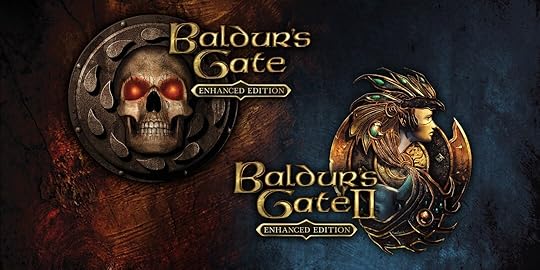 Baldur’s Gate (1998)
Baldur’s Gate (1998)The premise was you were a convenient orphan who was raised in the library-castle of Candlekeep. You could be a man, woman, elf, human, or whatever that was any number of professions. Freedom was maximized even if your story would probably indicate you would have been learning either how to fight or how to shoot fireballs in the version of Faerun’s Library of Congress.
Unfortunately, for Gary (as I named my protagonist), he has the problem of being a Chosen One. Not Chosen for anything good like the Dragonborn of Skyrim or Nezzarine. No, he is the child of Bhaal the God of Murder. Bhaal has been dead, a rare status for a god, for decades but his evil essence was passed down to all of his mortal descendants.
This is part of a complicated plot to resurrect himself as the surviving Bhaalspawn will kill each other off like immortals in Highlander. The survivors will grow stronger from each person they kill as well as each Bhaalspawn, justifying D&D experience, and eventually the last will become the new God of Murder.
The Highlander influences are actually pretty thick as your opponent is Saverok, your half-brother who is basically the Kurgan. They should have gotten Clancy Brown to do the voice instead of Kevin Michael Richardson (no shade on Trigon and Goro, though). Saverok is smarter than the Kurgan, though, as he’s doing a complicated plot to start a war where he’s supplying both sides with weapons as well as corrupting the iron ore so he has a monopoly on steel. It’s not your typical fantasy villain stuff and while you thwart him, I have to say he’s actually one of the smarter bad guys in gaming.
Part of what I like about is that it’s only from level 1-10 that you play. Most games go much-much higher. Yet you’re fighting Kobolds, Gnolls, skeletons, and giant centipedes rather than liches as well as other horrors. You can build a party from a couple of dozen NPCs, many of whom don’t get along at all, and while they don’t have much to say–some leave a big impression. For example, I will always love Imoen and refuse to accept she’s my half-sister when my character was fully in love with her.
No Kentucky jokes. Only we can do that.
 Siege of Dragonspear (2016)
Siege of Dragonspear (2016)I think it says just about everything you need to know about how Baldur’s Gate touched so many lives that they eventually released an expansion for the first game ten years later. Specifically, eight years after the sequel was done. It’s common enough to do a prequel to games but how often do you have an interquel? That requires a level of fan dedication and love that the developers believe exists to know all the characters as well as their complicated weird plots.
The Siege of Dragonspear is designed to bridge the gap between Baldur’s Gate and Baldur’s Gate 2: Shadow of Amn where the protagonist goes from being on top of the world to a hated outcast despite saving the world (or at least Sword Coast) from Saverok. You do, indeed, start off as living in the Ducal Palace of Baldur’s Gate, beloved by all (though my in-game reputation was absolute crap due to killing a few hundred guards), and spending time with his beloved sister Imoen.
Unfortunately, the reward for a job well done is to do it all over again and Gary is called upon to slay the Joan of Arc-like figure leading a crusade across the Sword Coast. No one is entirely sure WHY the woman is leading a crusade, but her followers are looting and pillaging in the name of all the gods. Which, given this is the Forgotten Realms, is ridiculous. The gods hate each other. So you have to get the band back together in order to lead an army to slay her and disperse her rebellious forces.
With ten years of game technology advances, the game looks visually spectacular while remaining an isometric top-down RPG. The dialogue also gets to take advantage of the fact that we know where all the characters will end up. The game is heavy on foreshadowing and contains one of the last performances by the amazing David Warner (AKA Batman: The Animated series’ Ra’s Al Ghul and Jon Irenicus). The protagonist’s dialogue options also get a lot “sillier” options, which implies the events of the first game have driven them to become a snarky bastard.
A sense of doom hangs over the expansion and the funny thing is that it makes the story much-much better, which shouldn’t be possible for two such classic games. The fusion isn’t always one hundred percent perfect but it’s close enough. In the end, no matter what you do, someone good is going to get hurt as well as the line between good and evil being blurred.
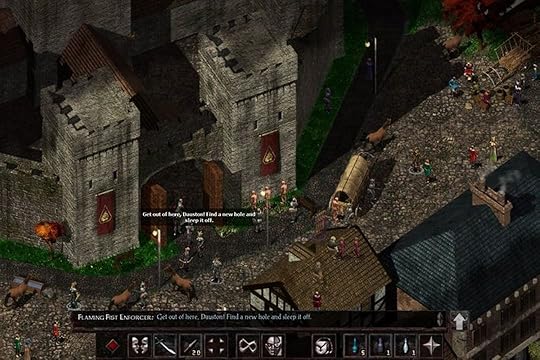 Baldur’s Gate II: Shadows of Amn
(2000)
Baldur’s Gate II: Shadows of Amn
(2000)The sequel to Baldur’s Gate is one of those stories that manages to improve on the original with a stronger plot, stronger characterization, darker tone, and motherfricking David Warner. The protagonist has found himself kidnapped by a mad wizard, tortured, experimented on, and stripped of their soul.
David Warner’s Jon Irencius is really what makes this module. An exiled elvish archwizard, he is possessed of a complex and interesting backstory that would give a George R.R. Martin protagonist pause. The protagonist isn’t left behind, though, as his relationships with his various associates are allowed to grow considerably. Baldur’s Gate II is where the option to have romances with his or her companions arrived. While some of them were undercooked, especially for female protagonists, others like Viconia have become iconic characters.
If there’s any flaws in the game, it is the fact that the story of the protagonist being the scion of Bhaal takes a backseat to its new villain. This is corrected heavily in the Throne of Bhaal expansion but, briefly, it feels like it is the Irenicus show instead of dealing with the fact you’re the child of an evil god. Which is a rare sentence. The deaths of the beginning of long-time party members Khalid and Dynaheir also added a sense of gravitas that players who didn’t let their party members meet the final death might have missed. Plus, you get to explore the Underdark and that’s always a plus.
It has little to do with Bhaal’s resurrection but is one of the best of Bioware’s stories even today.
Baldur’s Gate II: Throne of Baal (2001)Every journey must come to an end and the Throne of Bhaal is where it reaches its climax. Civilization is under assault by the last of the Bhaalspawn aside from you. The remainder of them have decided to team up in order to make sure there can be only one, sort of like the bad Tributes in The Hunger Games.
The Throne of Bhaal brings back the plot of your (un)holy heritage full force and the possibility of resisting becoming a monster or embracing that energy to become a god. It is a genuinely epic quest and one that suffers a bit for the fact that the bosses are somewhat one note compared to Saverok and Irenicus.
The Throne of Bhaal pulls out all the stops and you can effectively slay a god in its final levels or actually do slay a god (or the Lord of the Abyss) with the Demogorgon as a bonus boss. It also has a set of ending slides that manage to incorporate a wide variety of default states depending on your decisions as well as companions.
In the end, it is a suitable climax for what was a truly epic adventure until this point. The Baldur’s Gate franchise would continue after Throne of Bhaal as well with some books (that were absolutely awful–no offense to the author), comic books (which I adore), as well as an upcoming sequel with Baldur’s Gate III. The Enhanced Editions would also come out, making all of the games into a single epic adventure with improved graphics as well as game assets.
You can even play it on console.
The post Review – Baldur’s Gate appeared first on BEFOREWEGOBLOG.
March 22, 2022
Interview with Author Jacob Sannox

“Onetime,” insists the pikeman in Colonel Hawkins Regiment of Foote, owner and ruler of Fort Sannox. “Might piss off my mates.” I suggest that when one is an author reality is optional, but the onetime pikeman insists, and despite what you might have read a pike is mightier than a pen. Especially since I don’t even have a pen, only a laptop, where Sannox clearly has experience with all sorts of weaponry. Traveling through sixteen centuries requires precautions.
 When I first read The Ravenmaster’s Revenge, the first book in Jacob Sannox’s The Return of King Arthur series, I felt as if I just came off a rollercoaster that rode recklessly through history and genres, somehow ending exactly where it should have. I bought the sequel, Agravain’s Escape, thinking that now I knew what was coming. I was wrong – apparently, the first book was only a warm-up. What’s more rollercoaster-like than a rollercoaster?
When I first read The Ravenmaster’s Revenge, the first book in Jacob Sannox’s The Return of King Arthur series, I felt as if I just came off a rollercoaster that rode recklessly through history and genres, somehow ending exactly where it should have. I bought the sequel, Agravain’s Escape, thinking that now I knew what was coming. I was wrong – apparently, the first book was only a warm-up. What’s more rollercoaster-like than a rollercoaster?
“How would you classify the books?” I ask. “It’s a mix of urban fantasy, historical fiction, modern thriller… fortunately, Amazon has an ‘Arthurian Fantasy’ category, and I place the series firmly within it!” Sannox answers. I top up my drink. This isn’t a re-telling of the Arthurian saga. It’s “what happened next” – between the fifth and twenty-first century. Obviously, you only get the important bits… which are… I’m not very well acquainted with the last sixteen centuries of King Arthur’s doings, apart from those described by Jacob Sannox?
“Many stories of King Arthur feature his death and mention his return when England is at its greatest need, but I’ve seen very few (if any) adaptations where the return took place,” the author explains. “I started pondering a meeting between Merlin and Arthur in 2019, which ended up being a scene in a cafe. I had written the first chapter of the book, where the ravens at the Tower of London start acting strangely, which links with the saying that when the ravens leave the tower, England will fall.” (The author did not respond to my questions regarding Brexit tax tariffs.)
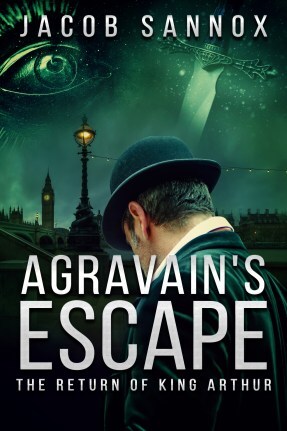 “It has been quite amusing that some readers have actually asked me if Arthur was REALLY involved in this or that, as the rest of the research allowed the scenes to seem credible.” (It did. Obviously, knowing fully well I was reading work of fiction, I was not one of those readers. Probably.) “The point of his return was necessitated by the Ravenmaster of the title. The Ravenmaster is linked to the ravens of the Tower of London. The ravens are, allegedly, linked to Charles II. Charles II was of the House of Stuart, which came under threat during the English Civil War…and the Ravenmaster, as Merlin’s apprentice, wanted his OWN version of Arthur. So I chose a project for him – James VI and I, who was the first king of England, Ireland AND Scotland. Arthur’s legendary role as king of the Britons pales in comparison.”
“It has been quite amusing that some readers have actually asked me if Arthur was REALLY involved in this or that, as the rest of the research allowed the scenes to seem credible.” (It did. Obviously, knowing fully well I was reading work of fiction, I was not one of those readers. Probably.) “The point of his return was necessitated by the Ravenmaster of the title. The Ravenmaster is linked to the ravens of the Tower of London. The ravens are, allegedly, linked to Charles II. Charles II was of the House of Stuart, which came under threat during the English Civil War…and the Ravenmaster, as Merlin’s apprentice, wanted his OWN version of Arthur. So I chose a project for him – James VI and I, who was the first king of England, Ireland AND Scotland. Arthur’s legendary role as king of the Britons pales in comparison.”
The books’ non-linear structure – putting it mildly – means that Sannox gets to kill off some of Arthur’s companions (you have a favourite knight? not anymore!) – but they might come back later, or rather earlier: “A character might die in 2019, but still feature in later books, as they are set partially in the past. And I am sowing plenty of seeds back there, which may bloom later on. For instance, it isn’t too much of a spoiler to say that Agravain gets mentioned once in book one, but his backstory becomes the driving force for the modern plot in book two. Likewise, some who died in book one, are seen in the past in book two. There’s lots of opportunities for examining different characters in different ways at different times.”
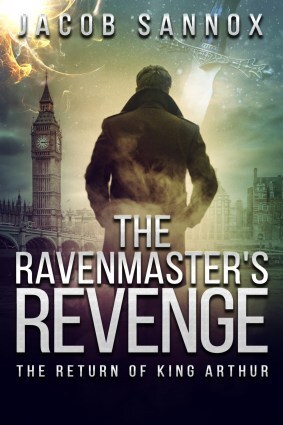 The third installment, Tristan’s Regret, is in the works now. Sannox suggests he’d like The Return of King Arthur to remain a trilogy, but I don’t fall for that. There’s too much creativity, research, and entertainment involved. “I suspect I may write more,” Sannox admits, somewhat reluctantly. “I have…ideas. Gawain could get a leading role, as could Merlin.” Right before I manage to express my excitement, he changes his mind: “I just thought of a new title. The Ravenmaster’s Revenge, Agravain’s Escape, Tristan’s Regret, and then… Bjørn’s Demise.” Hmmm. “How about Bjørn’s Ascent or Fame or Riches?” I helpfully suggest. “This is a Sannox book,” the (onetime) pikeman answers. “Good luck!”
The third installment, Tristan’s Regret, is in the works now. Sannox suggests he’d like The Return of King Arthur to remain a trilogy, but I don’t fall for that. There’s too much creativity, research, and entertainment involved. “I suspect I may write more,” Sannox admits, somewhat reluctantly. “I have…ideas. Gawain could get a leading role, as could Merlin.” Right before I manage to express my excitement, he changes his mind: “I just thought of a new title. The Ravenmaster’s Revenge, Agravain’s Escape, Tristan’s Regret, and then… Bjørn’s Demise.” Hmmm. “How about Bjørn’s Ascent or Fame or Riches?” I helpfully suggest. “This is a Sannox book,” the (onetime) pikeman answers. “Good luck!”
The Ravenmaster’s Revenge can currently be downloaded for free at https://books2read.com/ravenmastersrevenge
The post Interview with Author Jacob Sannox appeared first on BEFOREWEGOBLOG.
March 20, 2022
Review – The 13th Zodiac: Book One by L. Krauch
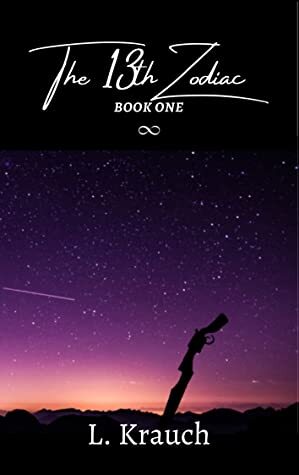 Once, there were four Titans:
Once, there were four Titans:
Urth, the mother of Gaea,
Sky, the father of the heavens,
Fate, the overseer of life and death,
And Time, the keeper of the Eternal Clock.
The lovers, Fate and Time, ruled over all.
Together they kept Gaea at peace,
Until one thousand years ago when
Mother Urth and Father sky created mortal man.
And shattered the Eternal Clock.
Time hated the children of Urth and Sky.
Thus, the Keepers were born.
Time assigned each to small pieces of Gaea,
Taking parts from Fate, Urth, and Sky.
Then, Time turned Urth into the Mother Tree
And dissipated Sky into the clouds.
The Keepers resented Time for what she had done.
For which Time banished them.
What her lover had done disgusted Fate.
To trap Time, Fate turned to the Keeper of the Stars.
Who Time shattered into twelve.
Creating the Zodiac – The heroes of mortal men.
Beneath the boughs of the Mother Tree,
Fate trapped Time for an eternity.
Angry and hurt, Time divided her soul in two.
Thus the 13th Zodiac was born:
Eternity
Time is fickle and petulant. She is the one ephemeral idea of which we simultaneously have too much and never enough. She promises never-ending tomorrows and warps the memories of our yesterdays. Time traps young hearts in decaying bodies and gifts wretched souls with youthful vigor. She tricks us into believing we are more or less than we are, than we could ever be. Time smiles as she gives with one hand and steals with the other.
In The 13th Zodiac, Lacey Krauch delivers her rendition of Time’s saga. Mortals, the children of Urth and Sky, tell their young the tale of Time’s ill-fated quest to repair the Eternal Clock and undo the creation of men. Time is their elusive boogeyman and her lover, Fate, their stalwart champion. But the Titans are distant, little more than fairy tales told as bedtime stories. The Zodiac are all too real. Twelve individuals bearing the sigils as birthmarks, evidence proving the stories are as real as their skin.
When Liya, the daughter of Aria’s Queen and her husband, Prophet Skylis, is born with the eternity symbol on her delicate newborn shoulder, Eternity, the thirteenth zodiac takes her first breath. Skylis, desperate to know the meaning behind his daughter’s mark, convinces Fate to allow him to see Time. Time, still angry over her lover’s betrayal, is trapped in a cave deep under the Mother Tree, held fast by ancient roots. Against Fate’s warnings, he begs Time to show him Liya’s future. Time grants his request, taking his eyes as payment. After all, one doesn’t truly need eyes to see. She kills Fate and is loosed on Gaea once again, determined to repair the Eternal Clock and erase men from existence.
Time chooses Soren, the cruel and grasping King of Chall, as her puppet, enlisting him to search for Liya, the princess of Aria. She gifts his kingdom with superior armaments and encourages his invasion of the tiny island kingdom to expand his borders and take possession of the princess. The now eight-year-old Liya escapes under the protection of sixteen-year-old Jemi, her sworn protector. They make their way to a Brighton, a small coastal village, and are adopted by a friend of Jemi’s father. There they live as commoners. Liya remembers nothing of her life as a princess. Jemi and the adoptive family are vigilant in hiding Liya’s true identity. Until one day, ten years later when a chance encounter with a man in the market. This man turns out to be the Crown Prince of Chall, Jase, Zodiac Leo. Jase has been searching for Liya for years. For reasons of his own, Jase has no intentions of taking the princess back to his monster of a father.
Alarmed by his sudden appearance, Jemi, Zodiac Aries, and her twin adopted brothers, Jiroo and Tokei, Pisces and Capricorn, with the assistance of a local shopkeeper, June, Sagitarrius, kidnap the prince and escape to Undall with Liya. Along the way, Liya’s zodiac-inherited ability to pause time becomes more and more evident. The group has questions and heads to the Keeper’s Library for answers. The librarians are also Zodiacs and happily assist the group on their quest to keep Time from her realizing destructive plans.
Skirmishes with soldiers from Chall, near-misses, breath-taking escapes, heart-breaking betrayals, and mind-boggling revelations stalk the Zodiac across Gaea from the gates of Chall to the Monastery of Fate Divided in the Dark Forest to the prison fortress of Mount Callous. Love is found and lost, families are created and torn apart. Zodiacs are discovered and scattered. Time is killed and a new Titan takes her place.
This book is a page-turner and threatens readers with losing track of Time. Give in to that impulse, just this once. Surely nothing bad will happen if you do.
Check Out The 13th ZodiacThe post Review – The 13th Zodiac: Book One by L. Krauch appeared first on BEFOREWEGOBLOG.
March 19, 2022
Review – Ghost of Tsushima
GHOST OF TSUSHIMA is a samurai open world game by the delightful people at Sucker Punch media who should be making a fourth InFamous game but decided to make this instead. Because the game is 90% fantastic, I’m going to forgive them for this. However, they really need to get on that since InFamous was a major influence on the Supervillainy Saga and part of the reason Gary is a guy in a hoodie who has an eternal battle with his alternate older cynical self. I mean, uh, I took nothing from those games.
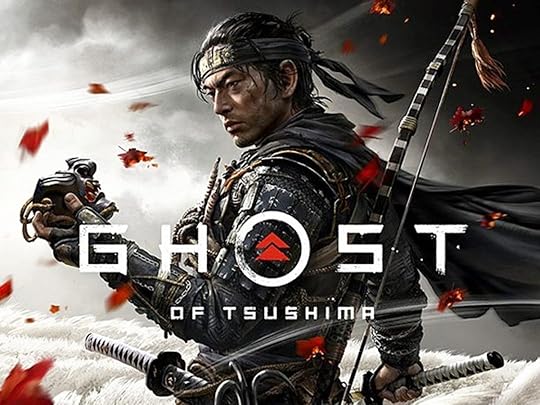 The premise is that you are Jin Sakai, a samurai who is nephew of the tiny island’s Jito (AKA Lord). The Mongols are invading the island during the first invasion of 1274 AD and that’s never a good thing. Historically, the islanders held off the Mongols for a day with their knowledge of the terrain and incredible archery skills, but Lord Shimura is an idiot compared to the real-life So Sukekuni and charges into battle straight away. Mind you, historically So Sukekuni had eighty men and the Mongols had eight thousand so neither of them were ever going to win.
The premise is that you are Jin Sakai, a samurai who is nephew of the tiny island’s Jito (AKA Lord). The Mongols are invading the island during the first invasion of 1274 AD and that’s never a good thing. Historically, the islanders held off the Mongols for a day with their knowledge of the terrain and incredible archery skills, but Lord Shimura is an idiot compared to the real-life So Sukekuni and charges into battle straight away. Mind you, historically So Sukekuni had eighty men and the Mongols had eight thousand so neither of them were ever going to win.
Unlike history, there’s a couple of survivors of the battle and one of them is Jin Sakai. Jin Sakai is nursed back to health by a beautiful thief named Yuna. Yuna thinks Jin can help her and her brother Taka get off the now-conquered island but her use of stealth as well as “dishonorable” tactics is a way to possibly fight against the Mongols. What follows is Jin eventually developing into a proto-shinobi (actual ninja not existing until the 15th century) who begins a reign of terror against the 8000 or so Mongols present.
This game is a mixture of ahistorical “cool” and surprisingly accurate details. Speaking as a guy with his degree in Asian history, I could tell you that katanas weren’t invented yet (and were in fact created as a way to fight Mongols), that “honor” certainly didn’t exist like it was described in this game, that the Mongols swiftly moved from Tsushima to Iki Island then the mainland, and Kublai Khan led the Mongol invasion of Japan rather than the fictional Kotun Khan. I’m not going to because I am not a relentless killjoy.
Indeed, Ghost of Tsushima is a game that is dripping with accurate historical details and fascinating insights into the culture of both Medieval Japan as well as the Mongol Empire. After the treatment of the Dothraki in Game of Thrones, it’s nice to have a game that remembers they were the most technologically advanced society in the world for centuries as well as an incredibly efficient empire that seemed unstoppable.
Khotun Khan may not be the most nuanced character but he’s an effective villain as well as an intelligent one. He’s not needlessly sadistic, he’s very needfully sadistic. What horrors he inflicts are only on those who resist and if you surrender without a fight, you are spared–something pride doesn’t let the majority of people agree to. I also very much enjoyed Jin’s conflict with his friend, Ryuzo, who points out that even if they manage to raise an army–it will be used as cannon fodder by his uncle’s questionable leadership.
But how does the game play? Basically, it’s Assassins Creed: Samurai Edition with all the good and bad that implies. It’s also more like the “classic” Assassins Creed games versus the new Witcher 3-like ones. You can do a lot of sword-fighting, yes, but the game gradually makes it harder and harder to do so until you are encouraged to make use of your ninja arsenal of throwing knives, fireworks, smoke bombs, and stealth skills. There’s also a dueling system that is immensely fun, but you can get annoyed when you suddenly lack access to all your toys. I would have loved duels where I could throw smoke bombs or knives.
Unfortunately, the game starts to get a bit tedious if you’re a completitionist around the second Island I actually put it down for a few months until I was ready to resume the grind of Mongol slaughter, fox chasing, and running around the map for collectibles. This is probably a game you might want to just do the story missions for and hope you’re properly kitted out for the final confrontations. Still, it is absolutely beautiful on every conceivable level, and I would often stop to stare at the fantastic art on display.
Ghost of Tsushima: Iki Island DLC
Deserving of its own spot in this review is the Iki Island expansion that comes with the Director’s Cut of the game. It adds a second island (and fourth zone) to the game in the titular island. Iki was the location of the second part of the Mongol Invasion and is a good location to continue the story from despite the fact it bears little resemblance to the real-life location. Basically, Iki Island is Mos Eisley or the Japanese Tortuga (The Pirates of the Caribbean one). It is an island almost universally inhabited by pirates, raiders, and smugglers.
While technically playable after you reach the second zone of Tsushima, the truth is this is much better played as endgame content when you have finished off Khotun Khan and his forces. The enemy types are much more varied and there’s a significant difficulty spike. Technically, it’s just more Ghost of Tsushima but there’s a few notable additions like the addition of saddlebags and horse charging mechanics.
 Iki Island has been invaded by the Mongols but this group of them is hyper-religious and into cult brainwashing as well as using drugs to drive individuals mad instead of straight up murder. It’s basically the Seed family from Far Cry 5. Their leader, the Eagle, is a shamaness who preys upon Jin’s daddy issues and PTSD from witnessing his father murdered in front of him. Jin finds himself poisoned early on and has to deal with the resulting hallucinations that, again, feel a bit more Far Cry than Ghost of Tsushima.
Iki Island has been invaded by the Mongols but this group of them is hyper-religious and into cult brainwashing as well as using drugs to drive individuals mad instead of straight up murder. It’s basically the Seed family from Far Cry 5. Their leader, the Eagle, is a shamaness who preys upon Jin’s daddy issues and PTSD from witnessing his father murdered in front of him. Jin finds himself poisoned early on and has to deal with the resulting hallucinations that, again, feel a bit more Far Cry than Ghost of Tsushima.
Much of the island’s story content deals with the invasion of Iki Island by Jin’s father twenty-years earlier that has some odd comparisons to the War on Terror. After dealing with numerous pirate raids, the samurai come to Iki island to establish order and root out the undesirable element. However, the locals get caught up in the attack and radicalized due to the samurai’s heavy-handed tactics. Personally, I think it’s a poor comparison and I kind of wish Jin could wipe out the pirates rather than focus on teaming up with them against the Mongols. Still, great storytelling and I think the emotional beats are stronger than in the main game.
Iki Island is exceptionally well-designed and every bit as beautiful as the main game with its own unique personality. The locals are kind of a bunch of scumbags, even the non-pirate ones, but that just underscores the DLC’s themes. Jin wants to defeat the Mongols and is willing to ally with everyone here but has a limit to how much he’s willing to let the locals shittalk his dad. I especially liked the character of Tenzo who thinks Jin is fooling himself with all his honor and nobility crap.
If I had a single complaint, it would be that the villain, the Eagle, is even weaker than Khotun Khan. She’s basically an evil witch and one-dimensional in her attempts to recruit Jin Sakai to her cause despite the fact hes’ carving up her tribe one Mongol at a time. We don’t even know what her goals are since she doesn’t seem to answer to Kublai Khan. Still, this is a small complaint for an overall excellent emotional ending to Jin’s journey.
The post Review – Ghost of Tsushima appeared first on BEFOREWEGOBLOG.
March 18, 2022
SIX ELEMENTALS AUTHOR INTERVIEW – LUCIEN TELFORD
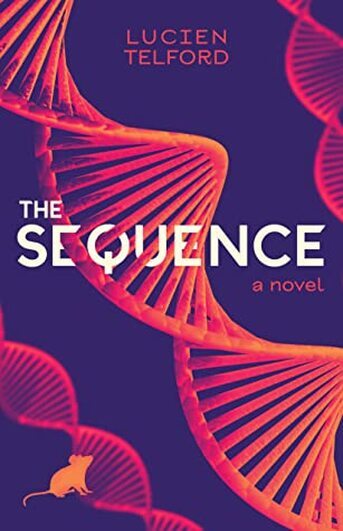
Six Elementals Author Interviews will introduce prospective readers to some of the best writers in their genre you may, or may not, have heard of, via a series of six questions. I encourage you to check out the work of these phenomenal creatives! Links to their websites and purchase links will always appear, accompanying the interview. Check them out!
I am very happy, because the amazing sci-fi author Lucien Telford joins me today, on Six Elementals Interviews! Lucien’s published work is: The Sequence.
P.L.: Thank you so much for interviewing with me, Lucien! I loved your novel, The Sequence, and one of the things I loved most about it was the gorgeous prose! You do not write like a debut novelist, but rather a savvy, polished veteran author, in my opinion! What is your writing background? How long have you been writing, and what inspired you to write a novel?
Lucien: My writing background is embarrassingly limited. With the exception of some childhood comics that I wrote and illustrated, and some collaborative lyrical writing with my band (Baked Goods) back in the 90’s, my writing background has exclusively consisted of course work during the creative writing classes I’ve enrolled in over the last five years. Those classes were all taken online, via edX, UBC, Coursera, and SFU’s creative writing program.
My inspiration to write a novel came from so many directions, I feel like we could do an entire interview just answering this one question! I would say largely it was that I saw a gap in modern science/speculative fiction that I very much wanted to read, so I wrote it!
I was asked recently what my inspiration for the book was while eating in a restaurant (and signing multiple copies of my book for family), and my response was, “well, my life.” I’ve lived several wildly different lives, and being able to draw from the rich tapestry of those experiences and then fictionalize and amalgamate them into settings, characters, and personalities of people I’ve known and places I’ve lived, I feel has brought a unique and tangible reality to my work.
P.L.: Your obvious talent proves that formal training in writing can be an asset but is not a requirement to be a great writer! Some of the world’s famous writers had no such training! There are some very compelling themes in your novel, and one of them involves the editing of human genes. I can imagine this topic must inspire a lot of debate amongst your readers, and possibly a lot of controversy. What made you touch upon this subject in The Sequence? What have your readers and reviewers of your book been saying about this aspect of The Sequence? What are some of your own thoughts about the subject?
Lucien: To discuss the genesis of how and why I chose to touch upon genetic editing would give away my favourite piece and surprise ending of the book (and you know what I’m talking about P.L. because you’ve read it – lol) but as I researched and investigated further into the possibilities that exist using just today’s available technology in the field of genetic scissoring using CRISPR-Cas9, I was both astounded and horrified that no governing body had, at the time, considered the ethical challenges that lay ahead of us as a species. We will, in the very near future be regularly editing the human genome, and the implications of germline editing, which means hereditable and permanent changes, will have evolutionary ramifications to humanity.
As for reader responses, reviews are slowly trickling in as the book has only been available since August this year, however the reactions to the genetic possibilities I ’ve written about in our near future have been surprisingly and consistently that the readers are horrified at what could be a very real possibility within our lifetime. It’s a subject not really in the minds of the masses and yet genetic changes are revolutionizing medicine at an alarming rate, without any due consideration to what long-term ramifications these changes will have.
Think climate change but for human evolution. We continue to alter the environment knowing we are making permanent and irreversible transformations.
P.L.: There is so much food for thought in the human evolution angle. But your book is much more than an exploration of that topic. I found The Sequence has so many layers to the book. It is part sci-fi, part-detective novel, part thriller, and much more. Is it difficult to write such a multi-faceted novel that somewhat blends genres?
Lucien: Short answer, YES! But from the very beginning I wanted to write a cross-genre novel, and I believe it’s the future of storytelling. Template-fiction has an audience without a doubt, and I follow the classic three act structure which one could argue is a template of sorts. But why limit ourselves to one genre? Isn’t it exciting to watch a movie like Blade Runner that combines science fiction with a hard-boiled detective plot? Or Star Wars, combining Science Fantasy and “Chanbara” (sword fighting movies). These are some of the most epic stories of our time and they successfully crossed multiple genres. I hope to accomplish the same!
P.L.: In my opinion, your story is definitely epic, so you have accomplished that! Who are some of your favourite sci-fi writers?
Lucien: My favourite author by a very long way is William Gibson. His work is the inspiration for so much of my writing. His style, his worlds, his characters, and his beautiful prose are the reason I write the way I do. Hunter S. Thompson for his brilliance and unique viewpoint on the world (I have a first edition of Fear and Loathing in Las Vegas.) Larry Niven for writing Ringworld, Frederik Pohl for the Heechee Saga. These writers and their works shaped my imagination from a young age right up until this very minute. Other notables include Philip K. Dick, Margaret Atwood, Tolkien, the list is long but these names in particular have helped me become the writer I am today.
P.L.: You have noted some real powerhouses! There are some thrilling action sequences in your book, and your background and knowledge as a pilot is obviously on display. Being a pilot is a thrilling and challenging job. But which is more difficult, flying a plane, or writing a book? How do you compare the challenges to each role?
Lucien: I would suggest that after thirty years of flying aircraft, and twenty plus years operating several different types of Boeing airliners, that flying an airplane has become second nature to me, whilst writing is a relatively new adventure. So in the same way that an inexperienced pilot will make many mistakes, and hopefully learn from them, I am finding similar challenges with writing. So armed with new knowledge, I’m hoping each novel I create will be better than the last.
Both disciplines however, require an incredible amount of homework to be successful. And much like watching a pilot fly an aircraft on a gin-clear day when everything is going well may look easy, a beautifully written book will elicit a similar response. However that pilot has studied their entire career, every six months we are trained then tested in full motion simulators to respond to multiple emergencies. With each test our licenses and jobs are on the line, so that when we go flying, our passengers ’ lives are not.
The published book we all hold in our hands is no different. The small visible tip of the iceberg is what we read. The years of research and rewriting and editing and study are not visible to the reader, but the end result is the same and always worth the effort.
P.L.: A man of many talents, including flying and writing! What projects do you currently have on the go? What can readers expect next from Lucien Telford?
Lucien: I’m currently working on the first draft of the sequel to The Sequence, entitled False Ignition. I have listened to my readers, and have given much more attention to the recurring and new characters’ reasons for why they are who they are. I’m excited to be writing it and I really do believe this book will blow the reader’s mind.
Beyond that I ’ve been outlining very generally the rest of the quadrilogy, and how I intend to weave together all these characters’ lives and technologies like the double helix of our DNA’s genetic sequence into a blockbuster series ending that I hope will generate some very complex, difficult and pertinent questions to our exponentially increasing quantity of emergent technologies.
Look for the Emergent Saga with the release of False Ignition, hopefully in late 2022.
P.L.: I am eagerly awaiting your next book, and all your future works! It was a real pleasure to speak to you today Lucien! Thank you so much for interviewing with me!
Lucien: Thank you for this opportunity P.L., it’s always a pleasure and I’m looking forward to seeing and chatting with you soon!
Twitter: @lucientelford
Instagram: @lucientelford
Webpage: lucientelfordbooks

The post SIX ELEMENTALS AUTHOR INTERVIEW – LUCIEN TELFORD appeared first on BEFOREWEGOBLOG.
March 17, 2022
Ten Recommended Classic Dungeons and Dragons Novels
I have to admit that Dungeons and Dragons is where I got my start in fantasy. Aside from The Hobbit when I was a small child, my first real experience was the worn paperbacks I picked up in my school library of Dragonlance, Forgotten Realms, and Ravenloft. However, for every awesome work of fantasy, there’s going to be five that aren’t up to snuff.
These are some of my favorite books from the TSR/WOTC era of novels and what I enjoyed most among them. There’s some other fantastic novels other than these but I don’t want to recommend a hundred of them.
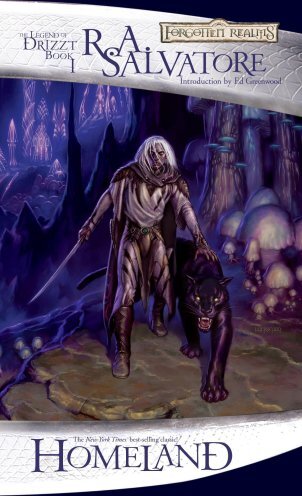 1. Homeland by R.A. Salvatore (Forgotten Realms, The Legend of Drizzt)
1. Homeland by R.A. Salvatore (Forgotten Realms, The Legend of Drizzt)RA Salvatore is one of the most successful fantasy authors of all time with over fifteen million copies of his books sold. The Homeland Trilogy is, for me, the best of his works. Setting in the underground city of Menzoberranzan, the dark elf race is a theocratic and sexist fascist state that practices racial supremacy as well as worship of the demon princess Lolth. In this horrific environment, a young drow boy named Drizzt Do’Urden is born.
Drizzt is, to turn a phrase, “Not like other drow” and suffers from the pangs of conscience. Struggling to articulate why he does not feel ruthlessness and power-lust are the ways to live, he wishes to find something better but finds no other dark elves who feel like him. It’s a fascinating and well-done work that ranks among not just the best of D&D fiction but fantasy in general. Or maybe I’m just remembering it fondly because it was the best thing ever when I was fourteen. Maybe both.
Needless to say, if you read this trilogy and like it, you have about thirty other books starring Drizzt to read thereafter. RA Salvatore is a writing beast and they’re a steady meal that I have enjoyed for decades.
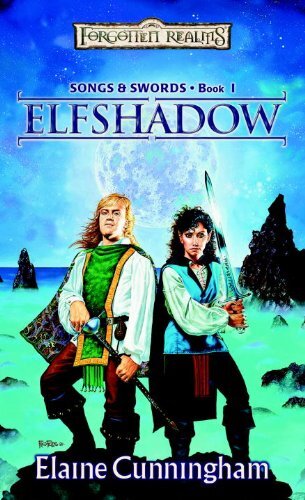 2. Elfshadow by Elaine Cunningham (Forgotten Realms, Song and Swords)
2. Elfshadow by Elaine Cunningham (Forgotten Realms, Song and Swords)The Drizzt Do’Urden books are fascinating tales about a ranger dealing with racism on the surface as well as the philosophy underscoring life, the universe, and everything. Unfortunately, the metaphor of Drizzt Do’Urden for oppressed minorities breaks down since his people are the equivalent of Nazis.
Elfshadow deals with the metaphor of racial bias in Dungeons and Dragons in a more successful way by making the subject Arilyn Moonblade, half-elf. Arilyn is a Harper, sort of a secret service for adventurers, and the reluctant wielder of the Moonblade. The Moonblade is a sacred elvish relic designed to protect their species from its many enemies. The relic kills anyone who isn’t worthy but a lot of elves take it personally the gods think Arilyn is.
Arilyn isn’t an elvish nationalist and can barely stand her people at times. She’s also attracted to a human wizard (who acts like a bard) named Danillo Than. It’s a rocky-rocky road for Arilyn and no one can say which side of her heritage she’ll end up pursuing–or if she needs to make a choice at all.
 3. Azure Bonds by Kate Novac and Jeff Grubb (Forgotten Realms, The Finders Stone Trilogy)
3. Azure Bonds by Kate Novac and Jeff Grubb (Forgotten Realms, The Finders Stone Trilogy)One of the early successes of the Forgotten Realms, Alias is a woman who wakes up with no memory of her past and a magical tattoo. Describing more of the plot would potentially spoil it but it is an odd collection of weirdos that slowly become a family as well as resolve a fascinating mystery. I really enjoyed the character of Alias and think this is one of the most Dungeons and Dragons-like novels in this novels I’m listening.
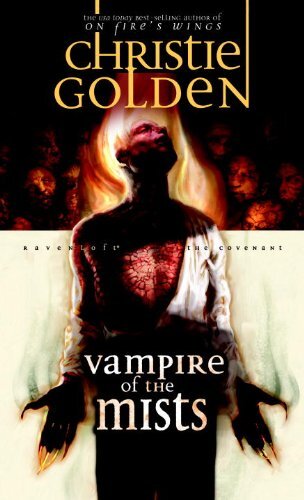 4. Vampire of the Mists by Christie Golden (Ravenloft)
4. Vampire of the Mists by Christie Golden (Ravenloft)Ravenloft is a fascinating setting as well as a frustrating one. Created around the Hollywood Transylvania-like nation of Barovia, Dungeons and Dragons chose not to make it a setting like others but a weird demiplane where it touched multiple other worlds before drawing in the wicked or simply vulnerable. This premise was best illustrated by Vampire of the Mists. Jander Sunstar, elvish vampire, is sucked into Demiplane of Dread where he becomes the semi-willing guest of Strahd von Zarovich.
A bit like Interview with a Vampire, Jander is the “good” vampire to Strahd’s “bad” vampire but the two of them are stuck with each other since no one else can possibly understand their shared plight. However, there’s a limit to how far Jander Sunstar is willing to go to ease his loneliness and he unwittingly starts a religion dedicated to fighting the undead.
It’s a fun mix of Gothic horror and high fantasy.
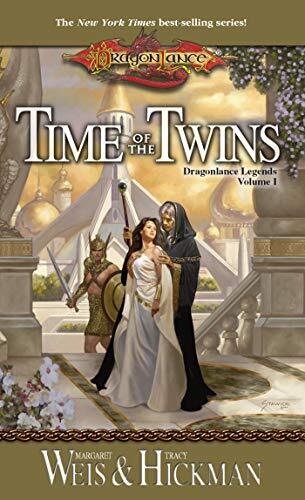 5. Time of the Twins by Margaret Weis and Tracy Hickman (Dragonlance, Legends)
5. Time of the Twins by Margaret Weis and Tracy Hickman (Dragonlance, Legends)I know what you’re going to say, but Charles, isn’t the proper place to start with Dragonlance the Chronicles trilogy? Time of the Twins is the first book in the Legends Trilogy that is the sequel to the Chronicles trilogy. Yes, my readers, this is true. However, the first fantasy novel I ever read was Time of the Twins and I loved it.
The War of the Lance is over and the Heroes of the Lance have been feted as legendary heroes. However, not every one of them has landed on their feet. Caramon Majere, warrior, has become nothing more than a fat drunk due to being abandoned by his magic-using twin brother, Raistlin. Raistlin has become the most powerful and feared wizard in the world but turned to the powers of darkness. A beautiful cleric, Crysania, has decided to recruit the former to engage the latter and things get complicated from there.
The storytelling dynamics of these books hold up decades later and I regularly re-read them. What happens after the big adventure? What new vistas are left to conquer?
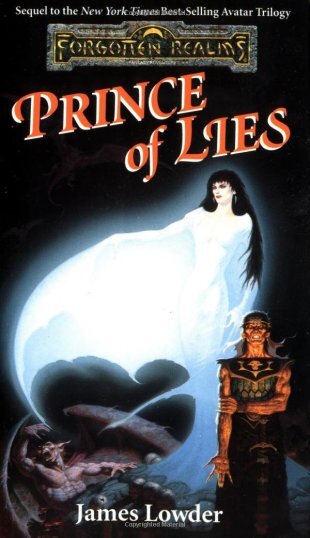 6. Prince of Lies by James Lowder and The Crucible: The Trial of Cyric the Mad by Troy Denning
6. Prince of Lies by James Lowder and The Crucible: The Trial of Cyric the Mad by Troy DenningI’m cheating by including these two but they’re not quite a duology and both work as standalones. Both of them deal with an area not often discussed by Dungeons and Dragons: gods and how they react. It is also a book from the perspective of one of the gods of evil no less. Cyric the Mad, God of Evil, has been royally screwing up his side. This would be good if not for the fact that there must be a cosmic balance in the universe.
Both of these books follow various deities and mortal champions as they attempt to deal with Cyric’s erratic, even stupid, behavior that causes massive damage to both his side as well as the side of good. I really enjoyed both books and think they get into the Olympian-like antics of Toril’s heroes.
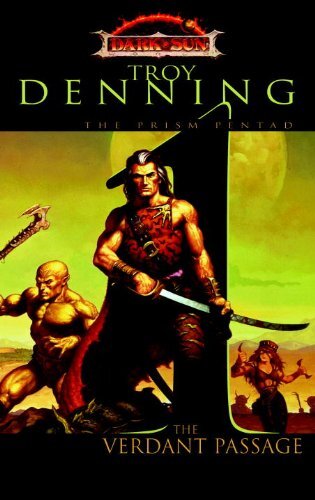 7. The Verdant Passage by Troy Denning (Dark Sun, The Prism Pentad)
7. The Verdant Passage by Troy Denning (Dark Sun, The Prism Pentad)Dark Sun is a very strange setting that attempted to broaden what Dungeons and Dragons was all about. Basically, a magical post-apocalypse setting, Dark Sun had the majority of the world reduced to a brutal unforgiving desert ruled by depraved sorcerer kings. Troy Denning took this opportunity to tell a huge epic about a group of adventurers who make the decision to tackle this world head on and do their best to save it.
Sadira of Tyr and her companions are part of the city-state of Tyr’s resistance against the brutal sorcerer king, Kalak. They are determined to be heroes and overthrow the tyrant but even when the book was first written, they weren’t your typical adventurers. The antiheroism was strong in this group and made all the stronger for their ruthless Darwinist society.
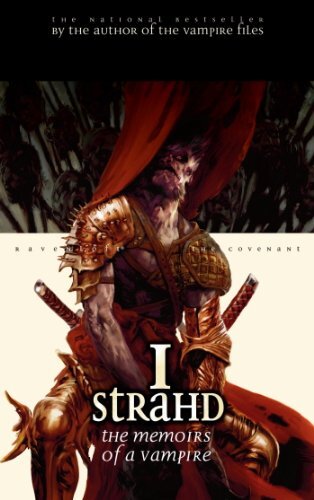 8. I, Strahd by P.N. Elrod (Ravenloft)
8. I, Strahd by P.N. Elrod (Ravenloft)Strahd Von Zarovich is undoubtedly Dungeons and Dragons‘ greatest villain. The Count Dracula-esque antagonist not only had personality when most villains were, “Stay in the end of the dungeon waiting for the players to reach them” but also a genuinely compelling character.
So, reading his biography from his perspective is quite the treat. It may seem a bit redundant to read this with Vampire of the Mists but I actually think the books make excellent compliments. Specifically, I, Strahd has Strahd putting all of his actions in the best light possible and you can tell he’s outright lying in several places.
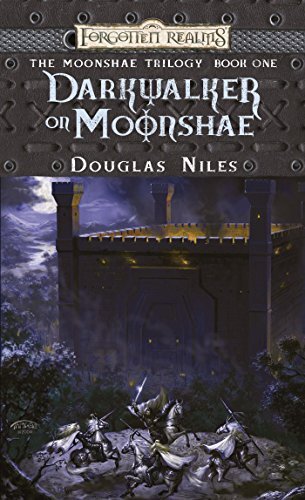 9. Darkwalker on the Moonshae by Douglas Niles (Forgotten Realms, Moonshaes Trilogy)
9. Darkwalker on the Moonshae by Douglas Niles (Forgotten Realms, Moonshaes Trilogy)The first Forgotten Realms novel was actually originally written unrelated to the setting but created one of the most vibrant and interesting stories of the setting. Part of what makes these books so good is the fact that they are set in a self-contained isle around a limited but likable royal family. The Kendrick family are worshipers of the Earthmother and living on the idyllic Irish-themed islands. Unfortunately, Bhaal the God of Murder has decided to summon himself in the physical world to lay waste to their home. That’s it and that is an impressive epic story by itself.
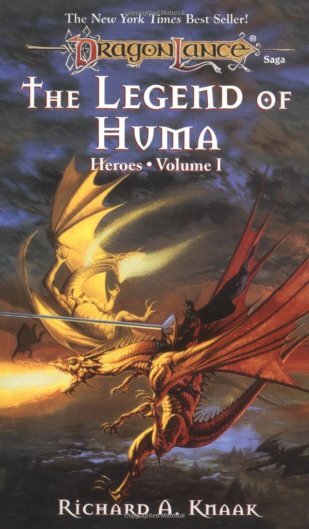 10. The Legend of Huma by Richard Knaak (Dragonlance)
10. The Legend of Huma by Richard Knaak (Dragonlance)One of my all-time favorite fantasy novels and what introduced me to the works of Richard Knaak. The Legend of Huma is a prequel to the Dragonlance Chronicles as well as Legends books. Takhasis, the Queen of Darkness, has started a massive war to conquer the world with the forces of good on the losing side. Huma, a young Knight of the Crown, finds himself the reluctant champion of the god Paladine against her efforts. It is a compact but entertaining story with a strong narrative that manages to introduce all the elements of Krynn you need to know without being otherwise familiar with the setting.
The post Ten Recommended Classic Dungeons and Dragons Novels appeared first on BEFOREWEGOBLOG.



